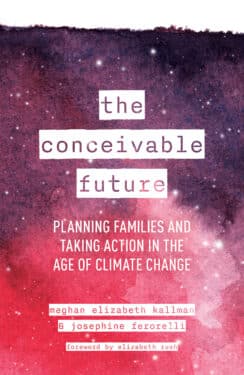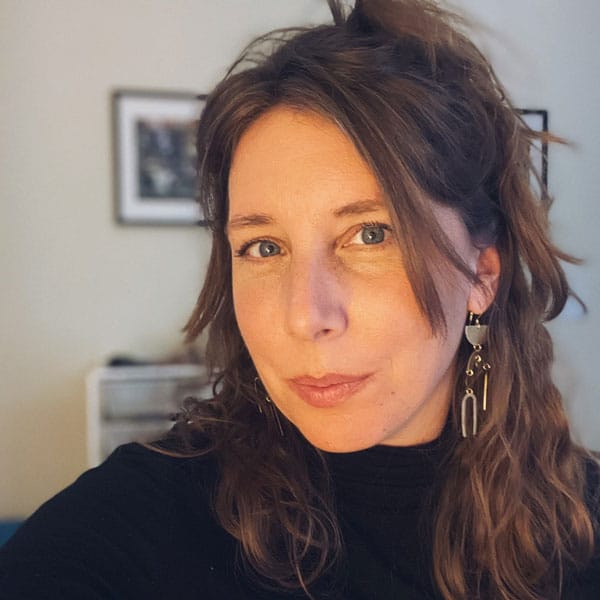Authors Meghan Elizabeth Kallman and Josephine Ferorelli explore reproductive choices with climate change at the door
On a warm, February afternoon in Chicago (a line that, having grown up here, I never imagined I’d write), I spoke with authors Meghan Elizabeth Kallman, PhD, and Josephine Ferorelli about their new book, The Conceivable Future, which explores how climate change is affecting families and reproductive health.
The book serves as a guide for the approximately 4 billion Millennials and Gen-Zers who are facing one of the biggest decisions of their lives: whether or not to have children. Young people are making these decisions during immense global unrest, driven by diminishing resources and increasing climate instability.
Regina de Leon Gomez, MD, is an obstetrician at Northwest Community Hospital and professor at Rosalind Franklin University. While many of the patients she sees have already made the decision to have children, they still face the fears and uncertainties around warmer temperatures, increased pollution, and exposure to chemicals — all of which impact their health.
Gomez has seen patients with indoor gas exposure due to improper ventilation in their homes; worsening allergies and asthma; and health issues from extreme heat exposure, including preterm labor, dehydration, and kidney stones.
“Patients want to get good information on how to best protect themselves. We recently had a community outreach event about a month after the worst air pollution event in Chicago [June 2023]. Families were very interested in how to protect their lung health, especially with so many children having asthma,” she says.
Gomez’s challenge lies in counseling her patients on how to mitigate risk while also not creating panic. “Moving patients and parents to act without letting them be incapacitated by fear or frustration is a bit of a tightrope to walk,” she says. “Being able to be healthy before, during, and after pregnancy is critical. Having babies that are born healthy is the best start to life.”
That’s where Kallman and Ferorelli come in. They embarked on the project that evolved into their book a decade ago. At the time, talking about climate change and family planning wasn’t a common conversation in public discussions. Individually, though, they found that people were experiencing anxiety around these questions.
“People badly needed to talk,” they write in The Conceivable Future. “In the absence of any sincere public discussion, this question — and the belief that there is a correct answer — was causing a private epidemic of grief, anxiety, guilt, stress, and fear.” Essentially, they found that people worried about two things: the harm the world would do to their baby, and the harm their baby would do to the world.
And it’s not only women expressing these concerns. In a 2022 study in the Journal of Marriage and Family, researchers reported that over the past two decades, the number of men in the U.S. who don’t want to have children has doubled. Many cite concerns such as cost of living, political turmoil, and climate change.
Gomez has seen this decision play out among her own colleagues and their children. “There is some lamentation when our children have expressed not wanting to have children because of the changed climate. So, this eco-anxiety and fear has a real impact on our psychology and it is multigenerational,” she says.
Here, Chicago Health sits down with Ferorelli, a writer and illustrator in Chicago, and Kallman, a Rhode Island state legislator and professor at UMass Boston, to discuss their new book, how climate change is impacting reproductive health, and ways to make the world a healthier place for everyone — from centenarians to those not-yet-arrived.

Meghan Elizabeth Kallman: For many people, including myself, it’s wildly unsettling. Part of what is psychically disorienting is that as we feel this weather — as wild as it is — we still have to go about the things of daily life. There’s a disjuncture between what we’re experiencing and what we know is right.
Josephine Ferorelli: It puts this rift between the mind and the body. Things proceed. We go about ordinary life as if it’s spring time, but the mind knows this is entirely dysfunctional and disorienting. There’s an internal incoherence. There’s something about the weird stolen pleasure of a hot day in winter that’s very uncanny.
CH: How did you land on the concept of family planning in the age of climate change? Did you ever think you’d write a family planning book?
JF: It’s one of these experiences where you pull on one thread, and everything jitters. It feels to me like a very thorough book about how we live now. We’re helping people think about and talk about these issues. I think we treat all the issues adjacent to reproductive lives, family planning, all of it — we treat it as an appendix to the issues that are “important.” But if we give them their due, our reproductive lives are a much bigger subject. It’s more illuminating to all people’s experiences than just a women’s health issue.
MEK: I’m laughing in part because we’ve been on a journey with how this book has been categorized. Really, we’re talking about people’s shared experience, moving from isolation to connection.
CH: How have your families reacted to the book?
MEK: I come from a family of people who work outside and understand climate change to be real. They’re climate people and scientifically minded people. But people’s responses to the project have changed over the years. It was very fringe-y when we started. When we camped out in this intersection 10 years ago, it was not a place many people had been. With our families and public discourse as a whole, we want to have these conversations on justice-based terms rather than on individual choices. We dedicated this book to our mothers and to the friend who introduced us.
JF: I come from a much smaller family than Meghan, and one of the bittersweet things about this book is that my mom passed eight months ago. Meghan came to New York, and we read our manifesto to my mom. She was very moved. She didn’t get to hold [the published book] in her hands, but she did read it and gave us great feedback.
CH: What surprised you most in working on this project?
JF: I don’t think anything about the project can surprise me anymore, but the book is really thrilling. It’s really thrilling to see it and to know it’s been the best and most we can say on the subject. I hope someone closes the book with a sense of more agency, more hope than they would have expected.
MEK: We had the opportunity in the book to tell the whole story. Like I said, it was fringe-y and sensationalistic in the beginning. The conversation has moved toward the mainstream, which really is not a good thing, because it means climate change is rolling along uninhabited. The ability to take a couple hundred pages and write it all out has been a real gift for us. I thought we were going to do okay with it, and it seems to be landing in a really welcome way for people.
CH: How do you respond to people who challenge you, who say that climate change isn’t real or is an overreaction, who don’t see the connections between our climate, the planet’s instability, and people’s concerns about having children?
JF: We don’t want to be the lightning rod. We go where the movement is, where the wiggle room is. There are a huge number of people in this country who are concerned about 70-degree days in February in Chicago and who are not sure what to do about it. They’ve only been told to ride a bike and use a reusable bag, or to vote. We’ve always just proceeded as if climate deniers don’t exist or that their views on this issue don’t matter very much. If they’re powerful enough to be a public-facing climate denier, they’re likely being paid to do it. What stands in our way is inaction, not ignorance. We’re talking to people for whom climate change lives in their heart. We’re talking to them about what they can do with it.
MEK: If you find the book in your hands, it’s because you’re seeking a framework to make sense of these issues. If you don’t want those tools, then you’re not going to pick up this book. We need to move folks from the passive to the active category. Climate is a huge portion of my platform. Rhode Island is a small state; there are fewer than 2 million of us. Most people’s state reps live within a few miles of them. It’s a much closer democracy. Rhode Island also has very aggressive, legally binding climate goals. Politics is a good place for me to plug in because of who I am. There’s a range of things that move levers — politics are one, but there are other interlocking levers. Political life will do you whether or not you do politics. And voting is a baseline, not the ceiling. It’s the floor.
CH: I imagine different cultures, different sexes, and people of different socioeconomic levels have different feelings about reproduction and climate change. Some may not even consider it at all. Have you found any patterns in your research? Who’s having these conversations, and who isn’t?
JF: One thing that’s exciting about being in this growing discipline is that a lot of research has been done that has validated and expanded our understanding of these issues. We weren’t sure, demographically, how widely this was felt. Globally, it’s hitting heavier and heavier across any demographic because these are equally held concerns — racially, socioeconomically. It’s experienced broadly but not in the same way because climate arrives in this unequal terrain. Climate is a driver of inequality.
MEK: There are well documented, different expectations between men and women. Anecdotally, we hear women expressing a different anxiety in this — not because they love their children more, but because their social role around motherhood is very different. Particularly women who don’t have children, they’re the subject of mockery, scorn, and disdain. The gender dimension is real and present. We did hear and still hear people fretting about how they will pass on their love to the next generation if they don’t have kids or can’t have kids.
JF: And there’s a certain kind of loneliness among men who aren’t parents. There’s a stigma of men without kids wanting to be around kids.
CH: In the book, you say that overpopulation isn’t a driving contributor to the climate crisis. So what questions should people be asking instead of focusing on their own, individual reproductive choice?
MEK: Why are institutions so wasteful and carbon-intensive? Why is it so carbon intensive to have a kid in this country, to live in this country, and how can we make that less true? By changing the institutions, we make the world safer for everyone’s children. We need to look upwards at levers of change instead of at our own wombs or controlling other people’s bodies.
JF: We culturally accept that women should have fewer babies for the environment. We perceive it as an easier target than telling corporations what to do with their emissions and profits. How can we value the right of reproductive healthcare for everybody? How can we recognize that this is a cultural good?
Photo of Meghan and Josephine by Nagamitsu Endo

An award-winning journalist, Katie has written for Chicago Health since 2016 and currently serves as Editor-in-Chief.










